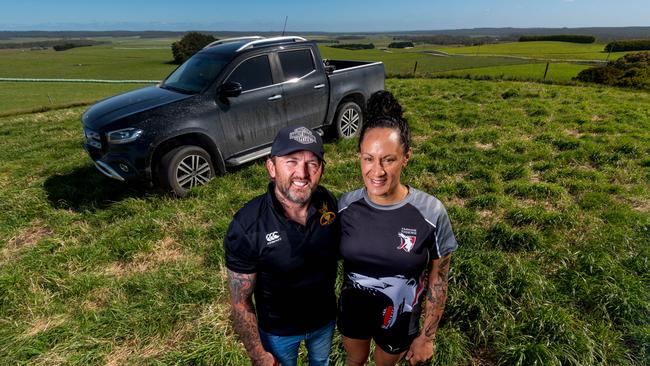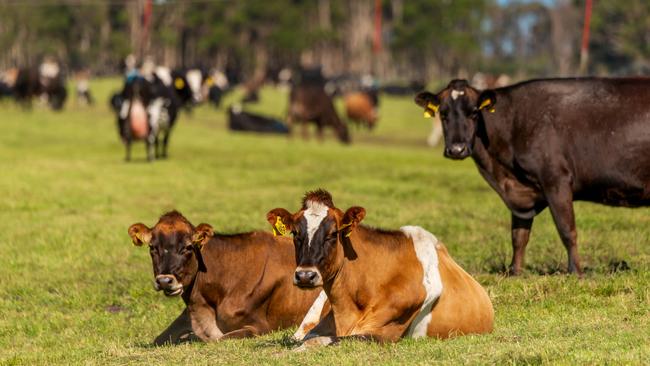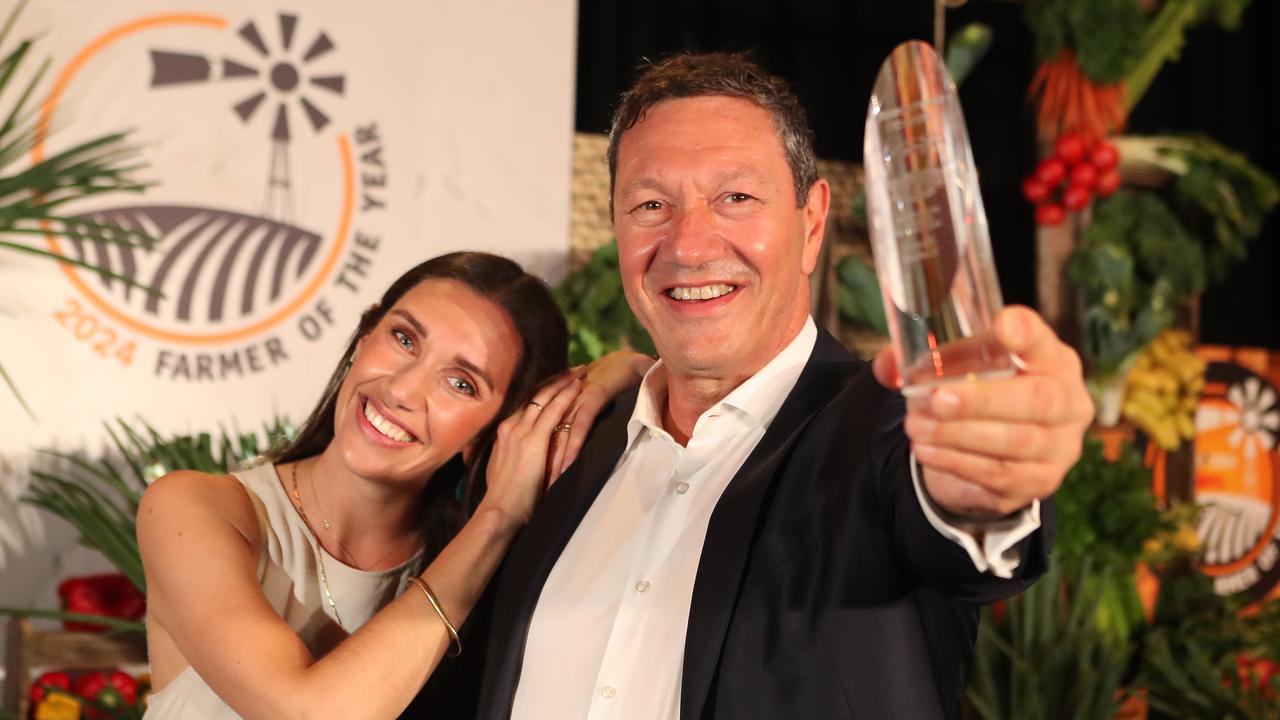Circular Head Farms: Joann and Craig Morgan-French on dairy sharefarming success
These former soldiers are using army-instilled work ethic to build an impressive dairy operation with uncompromising standards.
Military precision is the secret to success for Tasmanian dairy farmers Joann and Craig Morgan-French.
The couple milk more than 2200 cows and manage 11 staff across two properties at Montagu, in the state’s northwest, where they create a culture of camaraderie, discipline and work ethic.
The approach was drilled into them during more than a decade spent in the army, where they met, fell in love and learnt what it takes to be good leaders.
And it is helping them achieve impressive results from their herds and workforce, while setting up a bright future for their children, Chase, 15, Nayvea, 8 and Styles, 6.
“The team that we’ve got is probably the best team that we’ve had throughout our careers, and they are the backbone,” said Joann, 42, who grew up on dairy farms in New Zealand, where her parents were share farmers.
“My workers know exactly what standard we set. The standard is set quite high from the beginning, so there is no misunderstanding of what level they should be at.”
Joann and Craig expect hard work from their staff – which includes keen upstarts as young as 17 and seasoned workers as old as 71.
And they lead by example.
Working in a 50:50 sharefarming arrangement, the couple manage a dairy property for Circular Head Farms milking 600 cows, twice a day.
It is one of 11 sharefarming properties run by the company, which was founded to retain local farmland ownership and give aspiring dairy farmers a way to build equity.
“What the Circular Head Farms model was about was getting local people on dairy farms, keeping the money local and … enticing the younger generation to get involved,” Joann said.
When the Circular Head opportunity came up two years ago, they jumped on it, but needed an additional income to cover existing debt on machinery, cows and run-off blocks.
“We had to have a secondary income and it just so happened – it was fate obviously – Jane and Dave Field, who are private farm owners of the farm that boundaries the Circular Head farm, were looking for share farmers,” Joann said.
“We are pretty lucky to be able to land both jobs at the same time.”
On the Field Ag property, they milk 1450 cows, just once a day, and have a 500ha run-off block nearby, where they service replacement cows - a mix of Friesian and crossbred - for the farms.

CLEAN ADVANTAGE
There are unique challenges to both operations, not least adapting feed requirements and practices in the dairy to ensure the once-a-day herd is as healthy and productive as the smaller twice-a-day Circular Head herd.
This is where the couple’s drill-sergeant approach pays off.
Craig and Joann have implemented strict protocols to keep bulk milk cell count at impressively low levels and make sure any cases of mastitis are picked up as early as possible.
To achieve this, they’ve installed in-line milk filters in the dairy.
“Every cow is checked every day,” Joann said. “On the once-a-day farm, we only see the cows once a day, so every cow has to be milked out completely. If she has a little milk in one quarter, even though she might be finished, she has to be sent around again to get rid of that milk.
“If you are on the little farm, it’s OK – I’m not going to hold the whole row up for the cow that has a little left. But for a cow that’s on once a day, if she’s not milked out completely in that milking and you don’t see her again for 24 hours and the same thing happens the following morning, she (could) end up with mastitis.”
In-line filters are checked at every milking, so early cases are identified immediately.
They also swear by teat sprays.
“We don’t handle a cow’s udder unless it is absolutely necessary,” Joann said.
All staff wear gloves, and never use water near the cows.
“There is no reason to pass on bacteria,” Joann said. “On our backing gate we have a wash-down system and we don’t use that until all cows have left the yard so there is no excess spray.
“When a cow has been milking the only thing that needs to touch her teats is the teat spray.”
The meticulous hygiene routine means they consistently maintain an average bulk milk cell count of 90,000 cells/ml on the 600-cow farm. Industry considers anything below an average of 150,000 to be excellent.
They have also made massive improvements on the 1450-head farm.
“Before we got there, the cell count was averaging 250,000. Just from what we’ve implemented in the shed and the way we do things, we currently average 110,000-120,000.
“The farm owners couldn’t believe we could get it that low and sustain it.”
They aim to produce 500,000kg of milk solids this season on the larger farm, and 285,000kgMS on the small.

HARD WORK PAYS OFF
Milking cows is second nature for Joann, whose sharefarming parents moved the family from New Zealand to Tasmania in 1997 to take up an opportunity with Woolnorth Dairies.
Joann’s first real taste of exactly how hard dairying really was came when she was 17, fresh out of year 12.
She took on management of another Woolnorth herd, and within a year was milking six days a week and overseeing two staff.
“I didn’t know what I wanted to do, and was still in the mode of being a kid really,” she said. After 12 months, she decided it was way too much work at a young age, and looked for a different way to spread her wings.
“Then I thought the army might offer a way to be able to be paid to go see things and do things,” she said.
Enlisting at the age of 19, Joann was deployed to Timor in 2003, followed by tours in Iraq and Afghanistan.
In the army, she met fellow soldier Craig, from NSW, who also happened to be from a farming background, in cropping and sheep.
Craig is the one who convinced Joann to reconsider dairy farming as a good move for their young family after the army.
“He was the one who dragged me back to Smithton in 2013,” Joann said.
“Not that I couldn’t see the opportunity in dairy, but I knew how much hard work it was. “Especially if you want to get into management, share farming or farm ownership, there is no rest.”
Recognising the financial opportunities, however, Joann eventually let Craig tempt her to move to Tassie, where they started working with Joann’s parents on a dairy at Roger River.
Eventually, they moved to a management position with 40 South Dairies at Montague, which turned into share farming, eventually expanding to two farms and 1500 cows, and leading to their current positions.

PAY IT FORWARD
To get to this point in their careers has taken investment, as well as hard work.
They bought implements and tools in their first several years, as well as continuing to buy cows. When they took on the 1450-cow farm, they invested in more tractors, a silage wagon and motorbikes to manage the larger herd and property.
Joann said the higher prices of diesel, urea and grain this season were squeezing margins, but they were still “making ends meet”.
“The next 10 years should be good,” she said. “Production this year is up, maybe 20 per cent up compared to where we were last year.
“And we’re actually feeding less grain this year than we did last year.”
With more grass growth, they will make about 500 bales of silage on each farm, and are feeding each cow about 3kg of grain a day, compared with 6kg at the same time last year.
“Whatever we make on farm we try to use back on the farm instead of selling it or sourcing in from elsewhere,” Joann said. “That is the cheapest supplement you can get.”
Soil tests inform targeted applications of urea, to keep down costs.
The couple’s hard work has also paid off with recognition from industry, with Joann and Craig named share dairy farmer of the year at the 2022 Tasmanian Dairy Awards.
For them, however, the real measure of their success will be how they make the most of their current position.
“We would love for this to be an opportunity with Circular Head Farms to purchase the farm one day,” Joann said. “It would be amazing, and Circular Head Farms is totally supportive of being able to get us to that. We have plans to stay here for a long time.”




